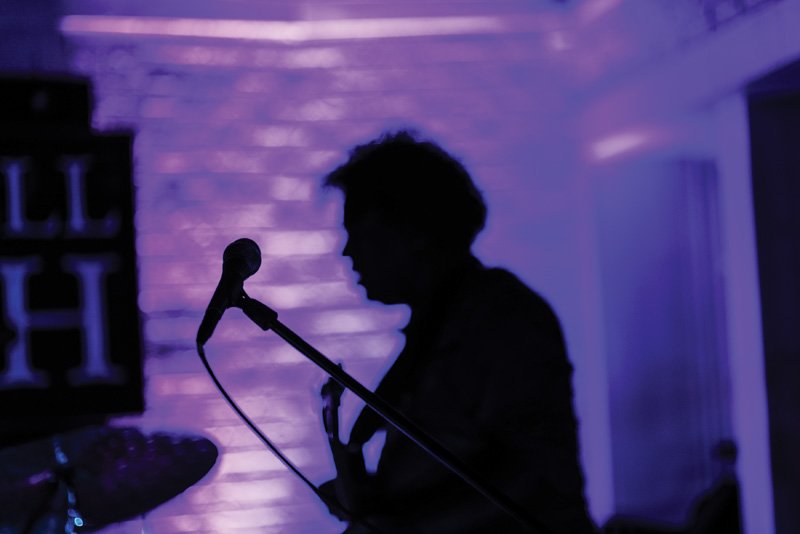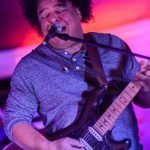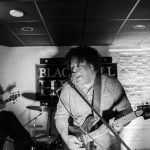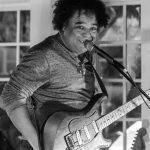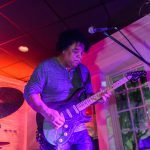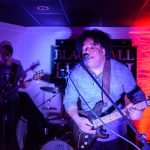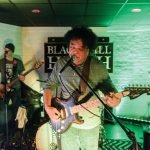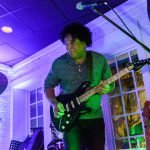+ By Leah Weiss + Photos by Alison Harbaugh
Ask professional Annapolis guitar players what they think of Michael McHenry, and a pattern emerges.
“This amazing guitar playing just shoots out of him like you and I breathe,” says Ruben “Swampcandy” Dobbs. “There’s no pretense. He’s just feeling it and enjoying himself. I think he tries to disappear into it and be present at the same time.”
 “He’s one my favorite musicians on the planet,” says studio musician and sideman extraordinaire Bryan Ewald. “His playing is so fluid and genuine, and his voice seems to have no limits. I’ve always admired how kind, humble, and supportive of other musicians he is, especially for someone so gifted.”
“He’s one my favorite musicians on the planet,” says studio musician and sideman extraordinaire Bryan Ewald. “His playing is so fluid and genuine, and his voice seems to have no limits. I’ve always admired how kind, humble, and supportive of other musicians he is, especially for someone so gifted.”
“His guitar playing embodies all of the qualities that the rest of us work toward: effortless fluidity, technical prowess, raw and emotional phrasing, deep groove,” says Black Rhinoceros and Pompeii Graffiti’s Ahren Buchheister. “He expresses with a heaviness of soul and a lightness of spirit.”
Warm and affable, McHenry is a modest man with incredible talent and a rich musical career. He’s a doting father who raised his daughter on his own. He smiles and laughs a lot, though his road has been rocky. He’ll downplay that Motown Records signed him in the 1980s, intending to make him their version of Prince (he chose not to go down that path, given the compromising that would come with it). He’s reluctant to even mention icons he’s played with (The Jackson 5, Sheena Easton, and George Clinton & Parliament Funkadelic, to name a few). He’ll speak humorously about his two-year sideman stint in Vegas for casino shows (“The pay was just astronomical, and it was my dream of being heard and not seen!”). All McHenry wants to do is play soulful, sexy, psychedelic, funky rock music, explore and soar with his band, and make people feel great on the dance floor.
McHenry was born in 1959 at the US Naval Academy hospital in Annapolis. Music constantly played in the household—recordings of Nina Simone, Sarah Vaughan, B.B. King, Ray Charles, and others. At an early age, McHenry became acutely aware of the power of music. “I remember a particular night, my dad was in the living room with all the lights out, playing Nina Simone’s ‘Four Women.’ I remember sitting there on the stairs, watching him listen to that song: ‘My skin is black . . . my manner is tough’ . . . that bass line . . . you [could] hear the years in her voice, that heavy tone. That stayed with me for a long time, I couldn’t wait to learn to play an instrument and have that effect. ”
 When he was in third grade, he saw a picture of Jimi Hendrix. “He was the craziest-looking dude you ever saw. I was just fascinated. And then I heard the song ‘Purple Haze,’ and that was it.” He knew he wanted to play guitar, and listened to Hendrix obsessively, drawn primarily to the tonality. “[There were] all those noises and sounds I wanted to make. Not so much the songs,” he chuckles.
When he was in third grade, he saw a picture of Jimi Hendrix. “He was the craziest-looking dude you ever saw. I was just fascinated. And then I heard the song ‘Purple Haze,’ and that was it.” He knew he wanted to play guitar, and listened to Hendrix obsessively, drawn primarily to the tonality. “[There were] all those noises and sounds I wanted to make. Not so much the songs,” he chuckles.
One day, while in sixth grade, McHenry saw a man sitting on top of a car at the local basketball court, playing a guitar. The man noticed McHenry walking by, staring, and beckoned him over. He put the Stratocaster on McHenry and allowed him to strum a guitar for the first time, and later loaned McHenry the instrument.
McHenry learned by listening to records and imitating and by playing with friends and sharing ideas. “A friend told me that ‘Purple Haze’ is in the key of E. I knew the top strong and bottom strings were E, so I would tune them to that song and just play up and down those strings. Eventually, I learned to cross on to other strings.” It all came naturally to him. “I had a guitar all the time, everywhere I went. It’s all I ever thought about.”
In high school, he branched out into jazz, learning the challenging material on a recording by Chick Corea’s band, Return to Forever. “That brought me to John Coltrane and Miles Davis . . . that’s what I wanted to imitate with my guitar—the sound of their horns.”
For McHenry, playing was, and still is, true expression—an outlet for emotion and creativity, therapeutic and cathartic. “Boys are not allowed to cry,” he says, “so I would play guitar.” Without understanding why or how it happened, he realized that when he played and thought about feelings and ideas, he could achieve the sounds he wanted to make. He started writing music and recording his own songs, doing the other instrumental and vocal overdubs himself—an approach he’s continued with all of his recordings.
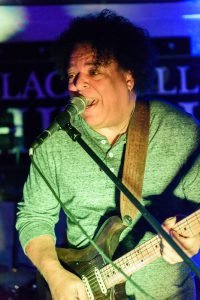 During high school, his parents allowed him to tour with a visiting gospel choir that had played at their church. Because it was a faith-based group, his mother thought it would be wholesome. “I might as well have been playing with the Rolling Stones or the Sex Pistols, because it was really crazy,” McHenry says of the atmosphere on the tour bus. Adding to the intensity was how the choir director seemed to enjoy manipulating people with music. “We played in a really subdued church, and he said to us, ‘We’re gonna make these people go crazy,’ and he did,” says McHenry, recalling the build-up, starting with the director’s piano intro, then the beat of the bass drum. “It took off, like blasting off on a rocket. And these people in this church were in the aisles, rolling around. It was like that scene from The Blues Brothers. That was a really heavy education.” McHenry felt so uncomfortable that he left the band.
During high school, his parents allowed him to tour with a visiting gospel choir that had played at their church. Because it was a faith-based group, his mother thought it would be wholesome. “I might as well have been playing with the Rolling Stones or the Sex Pistols, because it was really crazy,” McHenry says of the atmosphere on the tour bus. Adding to the intensity was how the choir director seemed to enjoy manipulating people with music. “We played in a really subdued church, and he said to us, ‘We’re gonna make these people go crazy,’ and he did,” says McHenry, recalling the build-up, starting with the director’s piano intro, then the beat of the bass drum. “It took off, like blasting off on a rocket. And these people in this church were in the aisles, rolling around. It was like that scene from The Blues Brothers. That was a really heavy education.” McHenry felt so uncomfortable that he left the band.
He began playing out when he met Scott Hymes, Richard King, and Joe Glumsic at Mum’s—now Dock Street—downtown. When his gigging schedule became robust, King encouraged McHenry to quit his day job. Against his parents’ wishes, he took the leap. “I never looked back,” he says. “It’s been a struggle, here and there, but I have been really fortunate to be able to do that.”
A prolific writer, McHenry’s songs emerge in different ways. Sometimes, while playing guitar, he’ll hear a chord progression. Other times, it starts with one sentence that comes to him. He enjoys allowing the song to unfold. Occasionally a complete song plays in his head. “I have to get to an instrument so I don’t forget it. I don’t know where that comes from.” His CDs are often thematic; one of his recent ones, Things You Thought Were Real, challenges commonly held beliefs, including ideas about religion and love.
After years of touring, McHenry settled back in Annapolis and established Michael McHenry Tribe. The band performs originals and covers, with improvisation at its core. Ryan Cullen, drummer with the band for 10 years, admires McHenry’s ability to lead. “He never struts his skill set. He searches for that chemistry. Over time, new arrangements organically start happening. People adhere and follow his direction because it has no ego or no self-intent to it. It’s all about this musicality and where it’s going next.”
“I love to play for people,” says McHenry. “You make people forget about their problems for a while.” A fan once told McHenry that his father, to whom he hadn’t spoken in years, would love the band. Father and son came to a gig together and later told McHenry that he’d improved the quality of their lives. Says McHenry, “That’s better than any money or a Grammy!” █
For more information, visit
www.michaelmchenrymusic.com.

